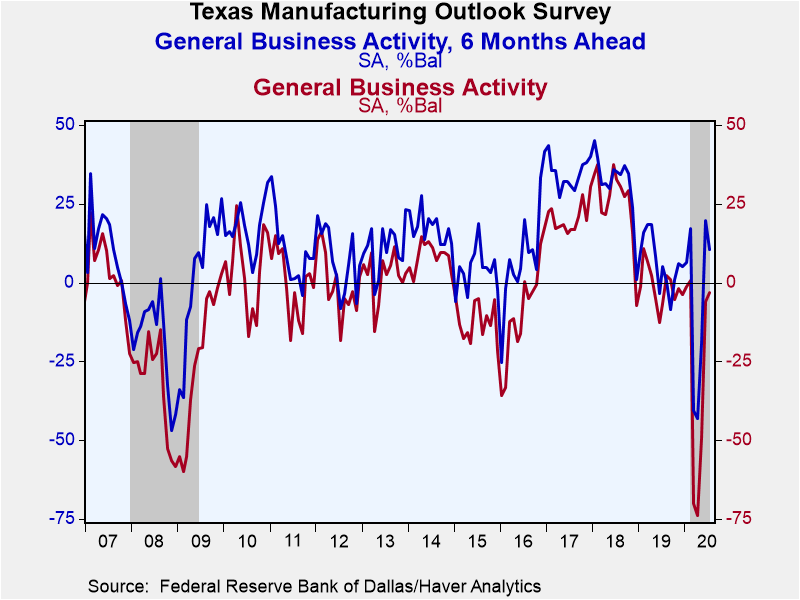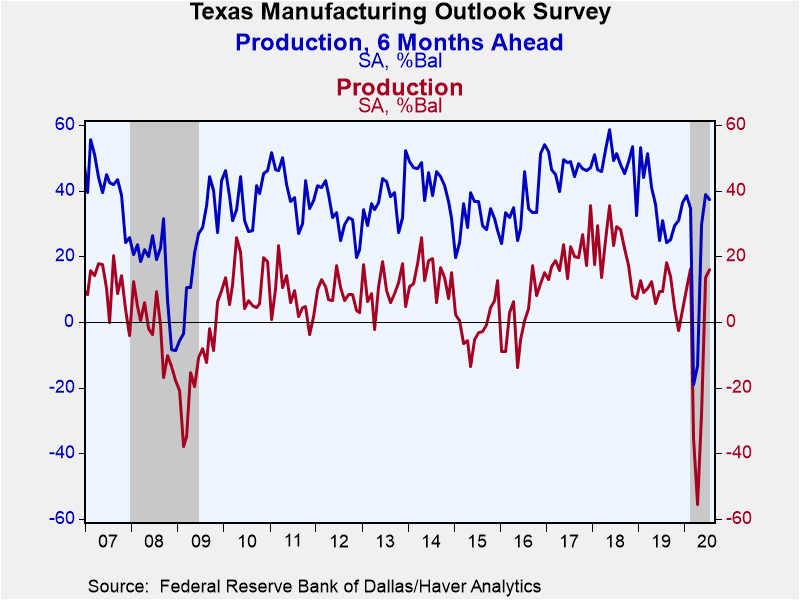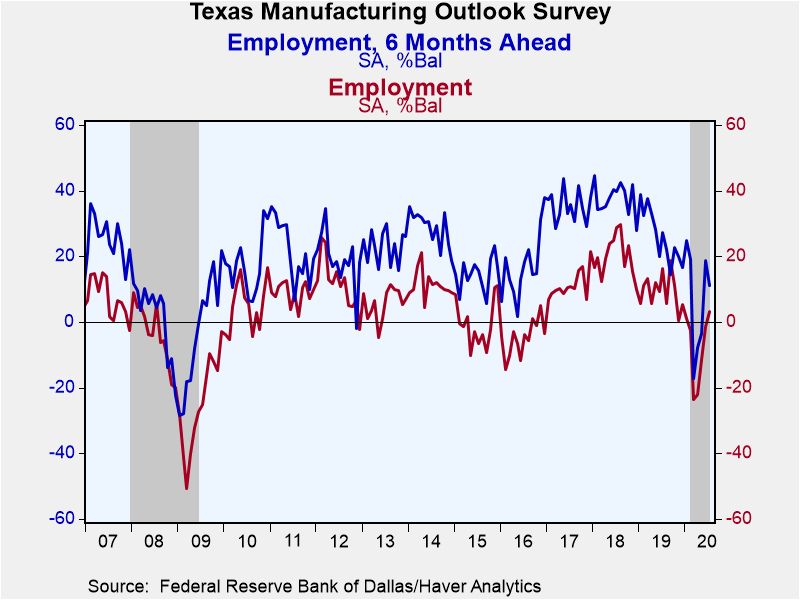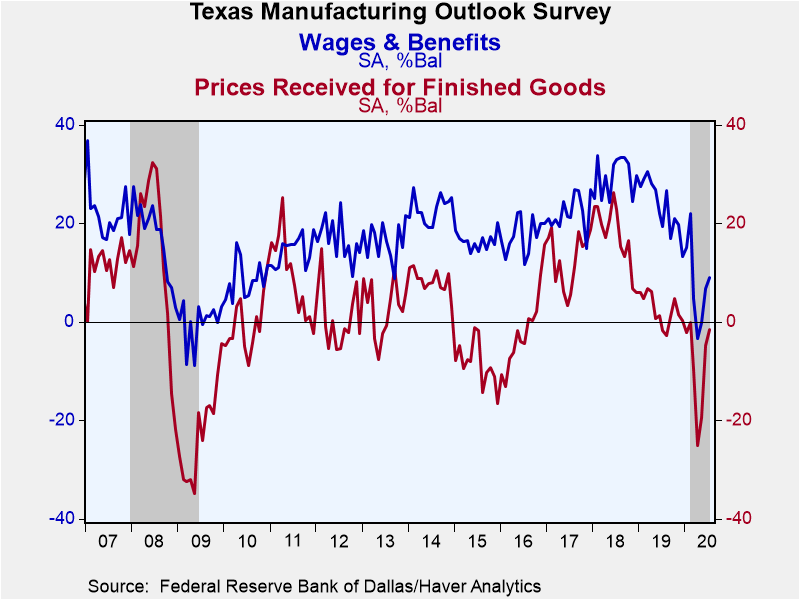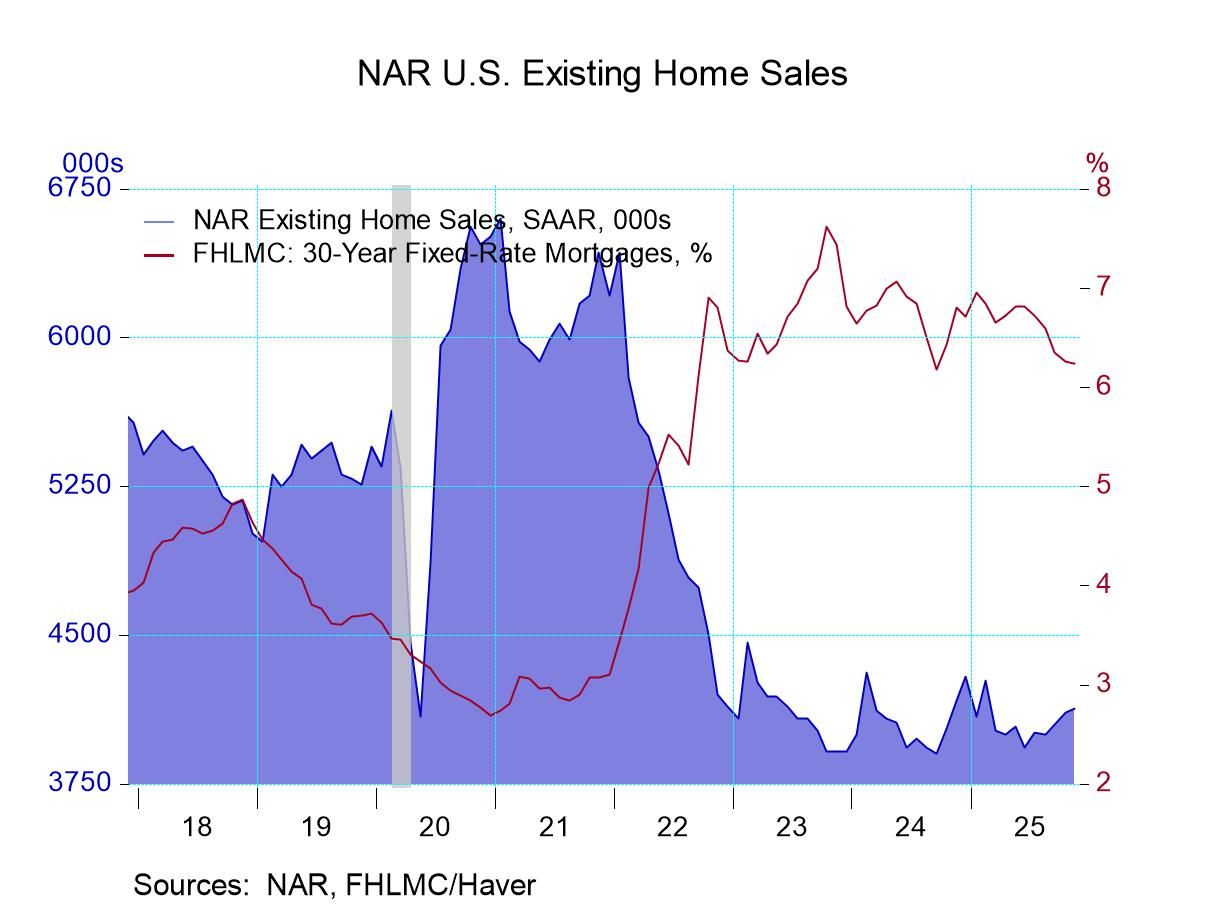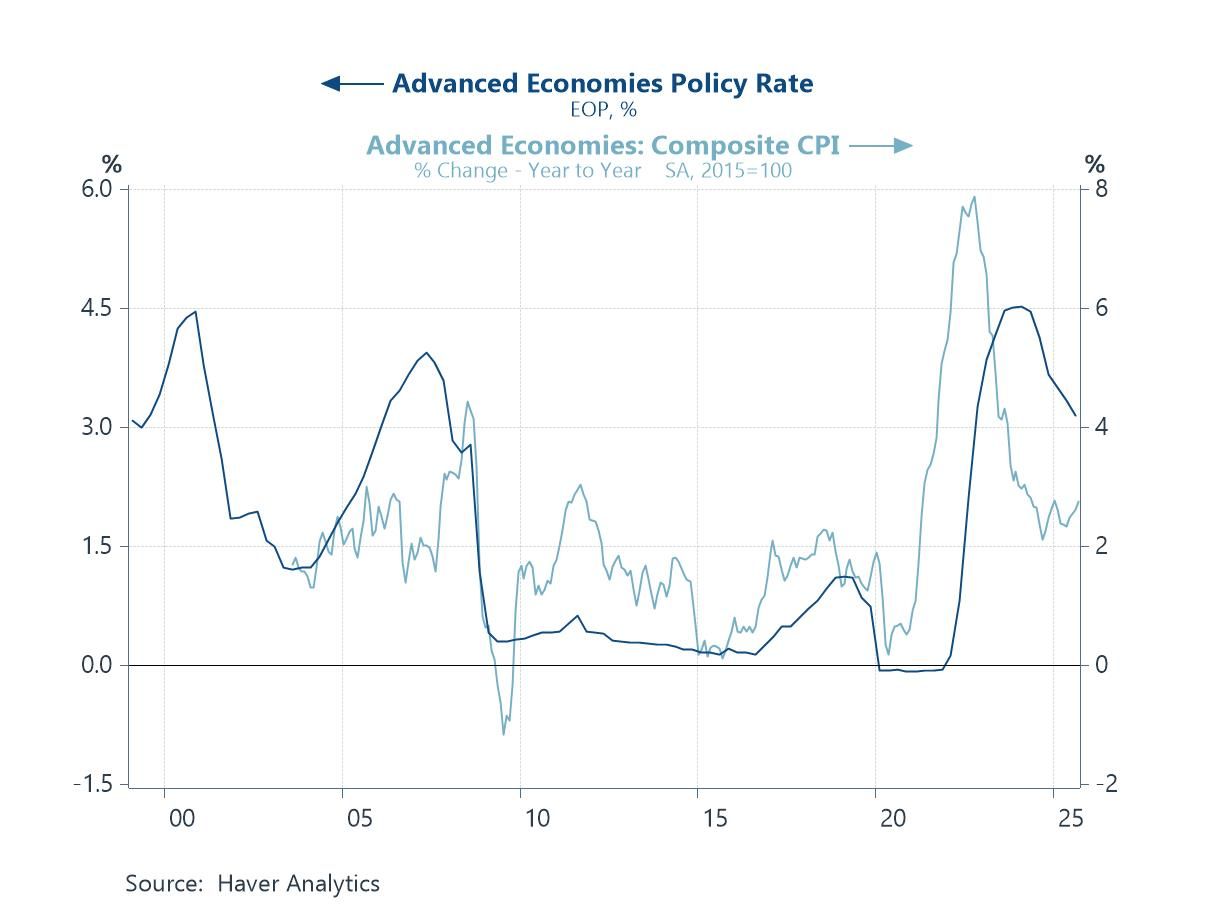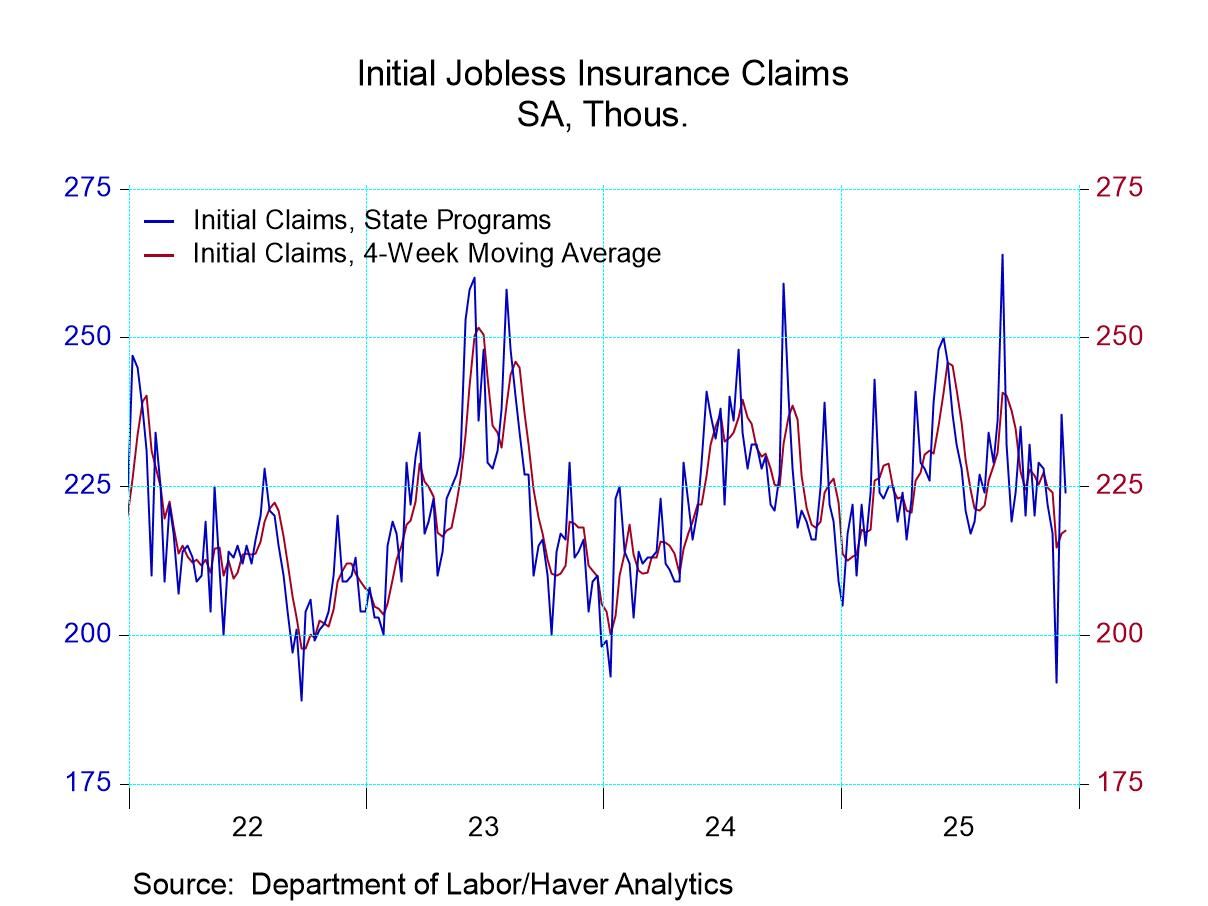 Global| Jul 27 2020
Global| Jul 27 2020Texas Factory Sector Continues to Recover in July
by:Tom Moeller
|in:Economy in Brief
Summary
• Manufacturing components show improvement. • Expectations are positive. Even though the Dallas Federal Reserve reported in its Texas Manufacturing Outlook Survey that the General Business Activity Index remained negative at -3.0% in [...]
• Manufacturing components show improvement.
• Expectations are positive.
Even though the Dallas Federal Reserve reported in its Texas Manufacturing Outlook Survey that the General Business Activity Index remained negative at -3.0% in July, there was widespread improvement in the factory sector. Moreover, the overall index is vastly improved versus the near-record low of -49.2% in May. (Data extend back to June 2004).
Improvement in each of the business indicators was evident this month as the production index rose to 16.1% from 13.6%. At 1.3%, the growth rate of new orders index was positive for the first time since February, while the unfilled orders index improved to 7.9%, its best reading in just under two years. The shipments index also rose to the highest level since August of last year, following severe weakness in May. The delivery times measure showed that order fulfillment has slowed.
The employment index strengthened to 3.1% this month, its first positive reading in six months. An increased 18% of respondents reported gains in hiring while a greatly lessened 15% reported a decline. The wages & benefits measure improved to 9.0%, though it remained weaker than the highs of 30% or more in the summer of 2018.
The index of prices received improved to a still-negative -1.5%, indicating the slowest rate of price deflation since February. A fairly steady nine percent of respondents reported higher prices while a lessened 11% reported a decline. While the raw materials price measure of 9.7% was a bit below June's index, it was the third consecutive positive reading. It remained well below the highs registered two years ago.
The index of expected business conditions in six months declined to 10.6% in July from 19.7% in June. This followed April's low of -43.0%. Strength amongst expected business indicators remained with the future new orders and future shipments readings strong. The expected employment index backed away from its June high as a lessened 26% of respondents expected higher employment and a higher 15% expected a decline. Future capital expenditures fell sharply.
Each index is calculated by subtracting the percentage reporting a decrease from the percentage reporting an increase. When all firms report rising activity, an index will register 100. An index will register -100 when all firms report a decrease. An index will be zero when the number of firms reporting an increase or decrease is equal. Items may not add up to 100% because of rounding. Data for the Texas Manufacturing Outlook can be found in Haver's SURVEYS database.
| Texas Manufacturing Outlook Survey (SA, % Balance) | Jul | Jun | May | Jul '19 | 2019 | 2018 | 2017 |
|---|---|---|---|---|---|---|---|
| Current General Business Activity Index | -3.0 | -6.1 | -49.2 | -6.7 | -1.1 | 25.8 | 20.6 |
| Production | 16.1 | 13.6 | -28.0 | 9.4 | 8.9 | 21.4 | 20.2 |
| Growth Rate of New Orders | 1.3 | -5.8 | -30.8 | 2.6 | -1.1 | 14.8 | 11.4 |
| Employment | 3.1 | -1.5 | -11.5 | 16.3 | 9.5 | 20.0 | 11.4 |
| Wages & Benefits | 9.0 | 6.8 | -0.2 | 19.4 | 23.5 | 29.7 | 22.2 |
| Prices Received for Finished Goods | -1.5 | -4.7 | -19.4 | -1.7 | 2.5 | 17.6 | 12.7 |
| General Business Activity Index Expected in Six Months | 10.6 | 19.7 | -19.0 | 5.0 | 6.4 | 31.6 | 34.6 |
| Production | 37.2 | 38.7 | 29.7 | 31.0 | 35.6 | 48.6 | 46.9 |
| Growth Rate of New Orders | 30.4 | 32.8 | 13.0 | 30.3 | 25.2 | 35.8 | 37.7 |
| Employment | 11.1 | 18.6 | -3.5 | 27.3 | 26.1 | 37.7 | 35.3 |
| Wages & Benefits | 22.5 | 21.6 | 12.7 | 44.4 | 39.7 | 50.4 | 43.4 |
Tom Moeller
AuthorMore in Author Profile »Prior to joining Haver Analytics in 2000, Mr. Moeller worked as the Economist at Chancellor Capital Management from 1985 to 1999. There, he developed comprehensive economic forecasts and interpreted economic data for equity and fixed income portfolio managers. Also at Chancellor, Mr. Moeller worked as an equity analyst and was responsible for researching and rating companies in the economically sensitive automobile and housing industries for investment in Chancellor’s equity portfolio. Prior to joining Chancellor, Mr. Moeller was an Economist at Citibank from 1979 to 1984. He also analyzed pricing behavior in the metals industry for the Council on Wage and Price Stability in Washington, D.C. In 1999, Mr. Moeller received the award for most accurate forecast from the Forecasters' Club of New York. From 1990 to 1992 he was President of the New York Association for Business Economists. Mr. Moeller earned an M.B.A. in Finance from Fordham University, where he graduated in 1987. He holds a Bachelor of Arts in Economics from George Washington University.


